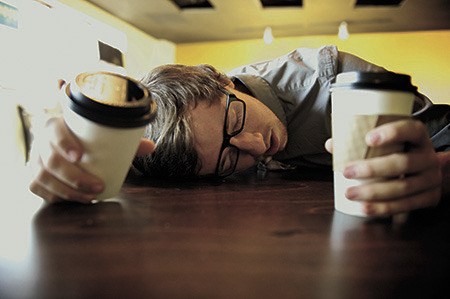You lie in bed in the darkness. It could be that the entire island is asleep and you are the only one for miles with your eyes wide open and mind running at full speed. Crippling questions enter your head like will I ever get back to sleep?
If this scenario rings true, don’t panic, you are not alone and the Sounder may have good news for you.
Roughly 41 million people in the United States — nearly a third of all working adults — get six hours or fewer of sleep a night, according to a recent report from the Centers for Disease Control and Prevention.
“I sleep maybe six hours a night, but it’s not solid,” said one Orcas Islander, who prefers to remain anonymous. “I worry … about things like finances for sending my kids to college.”
She said she will get up in the night and read or knit. She added, “My brain doesn’t slow down. I don’t get tired during the day, I just go.”
Bouts of insomnia may be more normal than we think. According to research by historian Roger Ekirch of Virginia Tech, sleeping through the night is not a trait shared by men and women of the past.
In 2001, Ekirch published a book with more than 500 cases pointing towards segmented sleeping patterns, meaning that humans used to sleep in two segments through the evening. The first sleep began about two hours after dusk, followed by a waking period of one or two hours of leisurely activity and then a second sleep. It took all the way until the 1920s for this practice to cease and for the eight-hour night’s rest to come into popular practice. It seems that with the introduction of street lamps and then the light bulb, people no longer needed to be in bed by dusk and therefore the two sleep periods eventually disappeared.
Although waking up in the middle of the night may be part of our natural cycle, there is research to support that getting sleep throughout the night is important.
According to studies from the Centers for Disease Control and Prevention, insufficient sleep is associated with a number of chronic diseases and conditions – such as diabetes, cardiovascular disease, obesity and depression. The National Sleep Foundation reports that most adults need seven to nine hours of sleep each night to feel fully rested while school children aged five to 12 years require nine to 11 hours, and adolescents aged 11 to 17 years require eight and a half to nine and a half hours each night.
For Val Harris, who has spent about 30 years in emergency medical services, a night of interrupted sleep was normal. As a paramedic, sometimes she would find herself drifting to sleep and would get a call out to the field, other times she would be out all night.
“I was used to operating on only a few hours of sleep,” she said.
Now that she has retired from her job as a paramedic, she has the luxury of sleeping through the night, but her mind and body won’t allow for a full eight hours of shut eye.
“I never thought not sleeping would bother me, but now as I’m getting older and I have hit closer to menopause, I’ve noticed a lot of disruption getting up through the night,” said Harris, who is 51. “It’s a rare night when I can sleep all night long.”
As Harris has navigated through her changing sleep patterns, she has learned a few tricks to getting more z’s.
“Shutting your brain off is one of the hardest things … I used to be way better at it,” Harris said.
She says that red wine in particular will make her really sleepy at first, but there is a rebound effect that will wake her later in the evening.
Another tip is to not eat late in the evening because it can create acid reflux and physical discomfort, which will make you restless in bed.
Harris says that having the right pillow and a quality mattress also helps with aches and pains that can keep you awake.
Her biggest piece of advice is to get sleep when you can.
“If you look at animals, like dogs and cats, they make no apologies for sleeping,” she said. “As humans we overanalyze everything and fight our natural rhythms and urges because we feel guilty about things like taking a nap.”
For more info on sleep issues, visit www.sleepfoundation.org and www.cdc.gov/sleep.



